Tiger Army’s Mike Fasano: One of the Most Trusted “Go-To” Drum Gurus in L.A. – Part 2 of an Exclusive 2-Part Interview
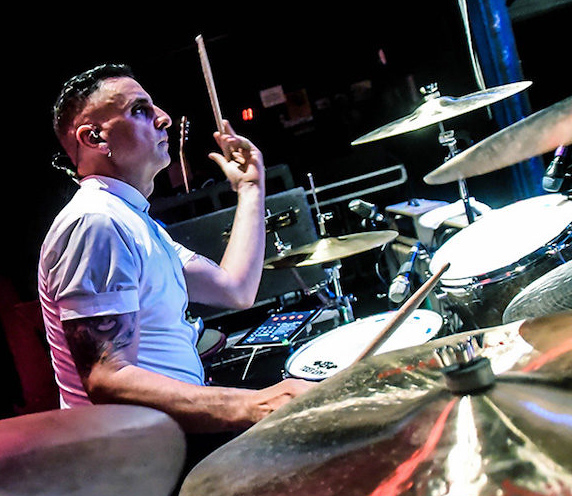
Mike Fasano. Photo Credit: Sami Photo.
In Part 1, we introduced you to Gretsch Drums Artist Mike Fasano. A passionate, energetic, and very talented drummer who lives in two musical worlds requiring good ears (and even better instincts).
When not recording and touring with Tiger Army, an L.A.-based rockabilly, psychobilly, and multi-music-genre trio (led by another Gretsch artist, guitarist/singer/songwriter Nick 13, plus upright bass player, Djordje Stijepovic), you’ll find Mike bringing his good ears, good music instincts, and years of experience to recording studios around the L.A. area.
That’s because Mike’s “day gig” is running a successful studio drum rental company. For more than a decade, Fasano has been known as the guy who can dial in your drum sound for recording sessions and has been one of the top and most trusted “go-to” guys for drum rentals, advice, and technical support in the L.A. recording studio scene.
In addition to providing drums (Mike has an extensive collection of more than 200 snare drums and 80 drum kits in his current inventory – including many Gretsches), Fasano is also there in the studio to tune drums and provide any input and advice if needed. It also helps that Mike is a well-above-average drummer in his own right and familiar with many music genres and styles.
In Part 1, Mike talked about his earliest drum memories, the impact of Stewart Copeland of The Police, going to school at “Princess Cruises University,” the many vintage Gretsch drums and drum kits he records with (and rents out for other bands to record with), and more.
In Part 2, we continue the conversation with Mike from his home in the San Fernando Valley in California to hear how a telephone call happened to lead to a Gretsch Drums Artist endorsement, how a new drum kit lifted Mike out of his 2020 COVID funk, how he views his role as a drummer in a trio, why Gretsch drums are the right drums for him and the evolving music of Tiger Army, and more.
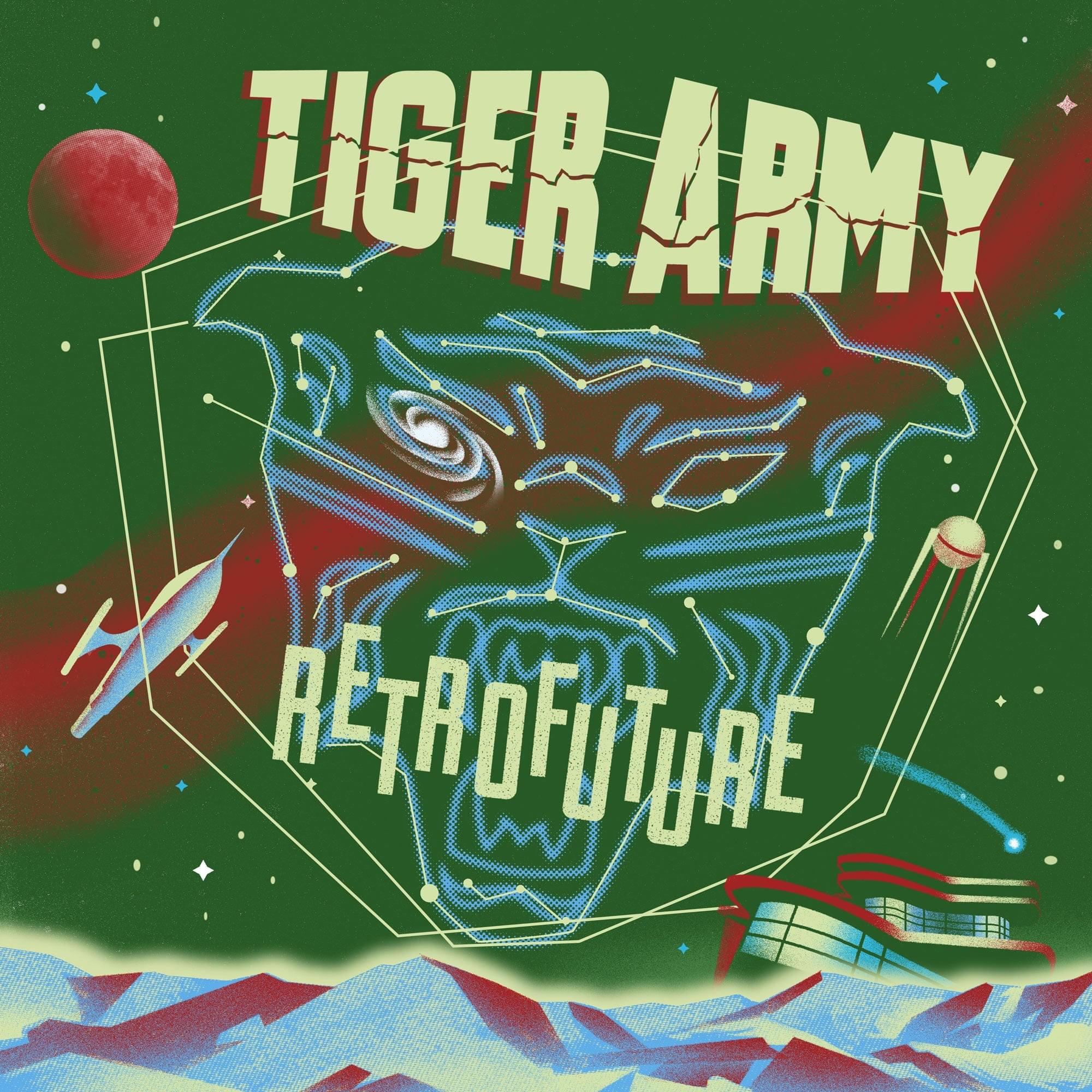
The cover of Retrofuture, Tiger Army’s sixth studio album that was released in 2019.
Tell us how you became a Gretsch Drums Artist.
The seed was actually planted by Nick 13. His Gretsch signature guitars were coming out and he said it would be really cool if I played Gretsch drums. I thought it would be cool, too, and the right vibe for the band since we’re in the rockabilly genre. I was going to order a kit and use it for Tiger Army, and I was telling my friend, Alex Gonzalez, who is the drummer for Mana, a massive rock band from Mexico, about ordering a kit and he said, “Wait a minute, Andrew Shreve (Gretsch Drums Brand and Artist Relations Manager) is my friend, let me call him first.”
So, Alex arranged a call with Andrew and must’ve said good things about me, because Andrew asked me why I wanted to play Gretsch drums. I told him I had always loved the drums and the sonic tuning range they had, and, at this stage of my career my sound was changing and Gretsch drums would be perfect for my evolution in Tiger Army. Andrew then offered me a spot on the roster as a Gretsch artist over the phone. He said, “I know the value of what Tiger Army is to the Gretsch brand and I know what rockabilly artists we have onboard. We have Slim Jim Phantom on the roster and there’s a spot for you too. You’re a veteran of this business that’s been behind the scenes, in front of the scenes with many bands, and we would love to have you.” I was blown away, but I’m a loyal guy. I guess it’s the Catholic school boy in me. I had been playing Pork Pie Drums for 27 years, and I told Andrew I needed to call my longtime friend and Pork Pie founder Bill Detamore first to let them know I was making a change. Bill was cool and understood it was just business, so on March 27, 2019, also my mom’s birthday, I signed my Gretsch contract and ordered my drums and here I am.
What does being a Gretsch Drum Artist mean to you?
Being a part of the Gretsch family and being on the roster of artists is like being on a legendary franchise, like, the Los Angeles Dodgers or the New York Yankees, you know? It was a real feeling of joy and accomplishment. I’ve been kicking around this business a long time and to get that offer to play on the Dodgers or Yankees, it really gave me a breath of fresh air, and hope. It’s a true honor playing on the Gretsch team.
So, you got your Gretsch endorsement drum kit just before COVID hit?
Yeah. In January 2020 my endorsement kit for Tiger Army arrived for our March 2020 tour. I just put them in road cases because I had another Gretsch kit I was playing in the rehearsal studio for our upcoming tour. Then COVID hit, and I admit I got the COVID Funk. I didn’t feel like playing, didn’t feel like practicing, I didn’t want to leave the house. But on New Year’s Eve of 2020, I said to myself, “You know what? We’re going to probably be in this COVID thing for a while. I’m going to get my new drums out of their road cases, fit as many as I can in my little drum room and start playing them. I’m going to start breaking them in, season them up, and get to know them.”
And that’s what I did. I put three rack toms up, a floor tom, a bunch of cymbals, and I was just inspired to play the minute I sat down behind them. Those new Gretsch USA custom drums, right out of the box with the factory Remo drum heads still on them, sounded amazing. No RIMS mounting system; direct-to-shell mounting. Hey, if it’s good enough for Vinnie Colaiuta, then it’s good enough for me. Of all the times in my life with this whole COVID thing happening, I needed inspiration. And these drums are definitely an inspiration to play.
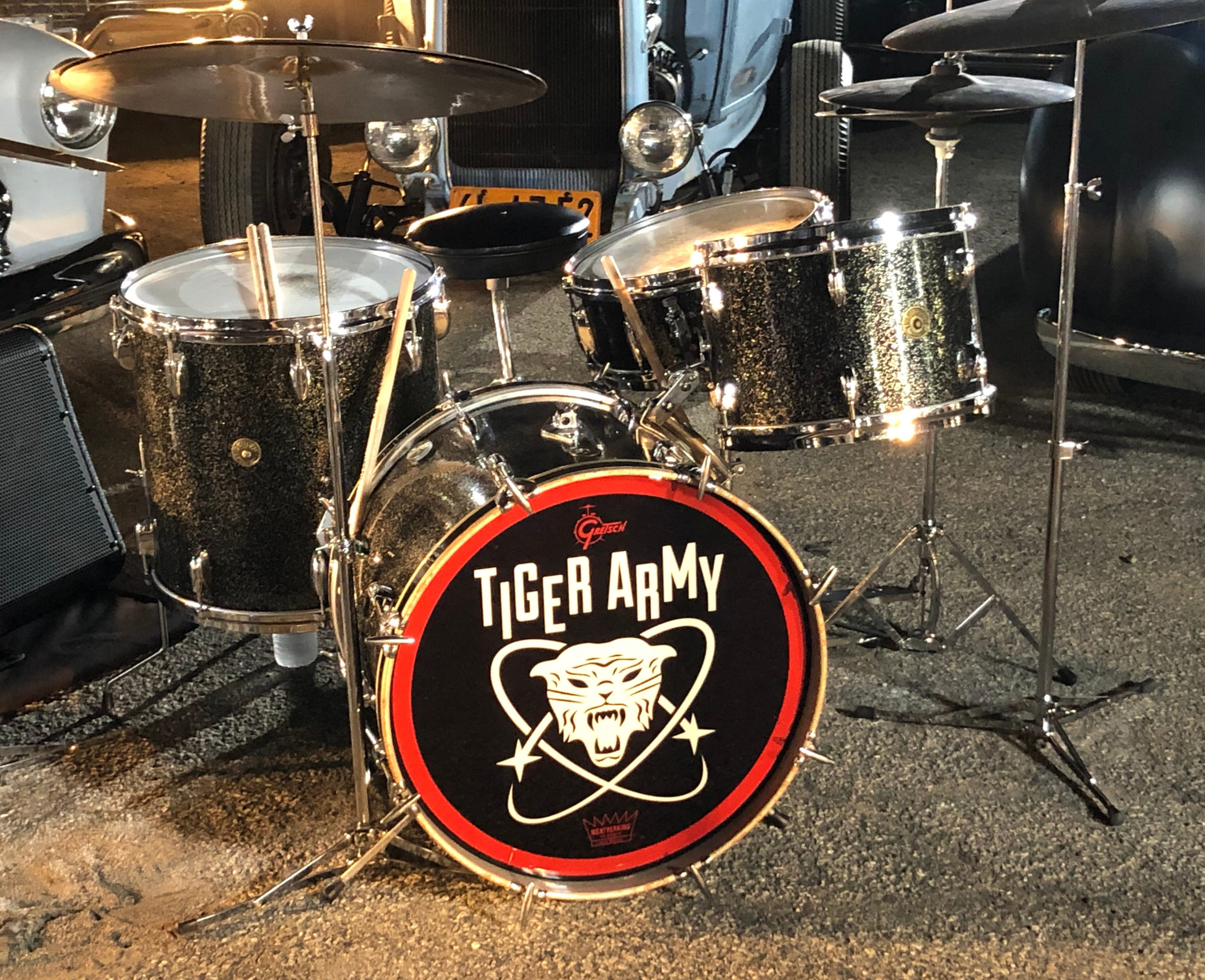
The Tiger Army logo is a perfect complement to Mike’s black sparkle vintage ’58 Anniversary drum kit.
Why are Gretsch drums right for you and Tiger Army?
For me, I’m playing more, and this is an old term, more combo music: rumba, and our version of Latin music, and a lot of different styles. And it’s dynamic. I can get really soft with it and still get great tone. And my tunings have changed, and my heads have changed, and I’m using smaller sticks and brighter cymbals. Big, dark, buttery cymbals are fun to play. Big, thick, fat, dead drums are fun to play, too, but that’ll never translate with this band.
I guess it’s the silver sealer, the die-cast hoops, the layup of the legendary USA custom 6-ply maple/gum shell. They really make it easy and musical to articulate all of the dynamic levels of all of the different songs in Tiger Army. Being older now and not being a meat-and-potatoes rock drummer anymore and having to be on my toes playing in Tiger Army, they just react. And they react to everything. If I strike it really hard or if I barely tap it, the pure tone is there. Nothing gets sucked out.
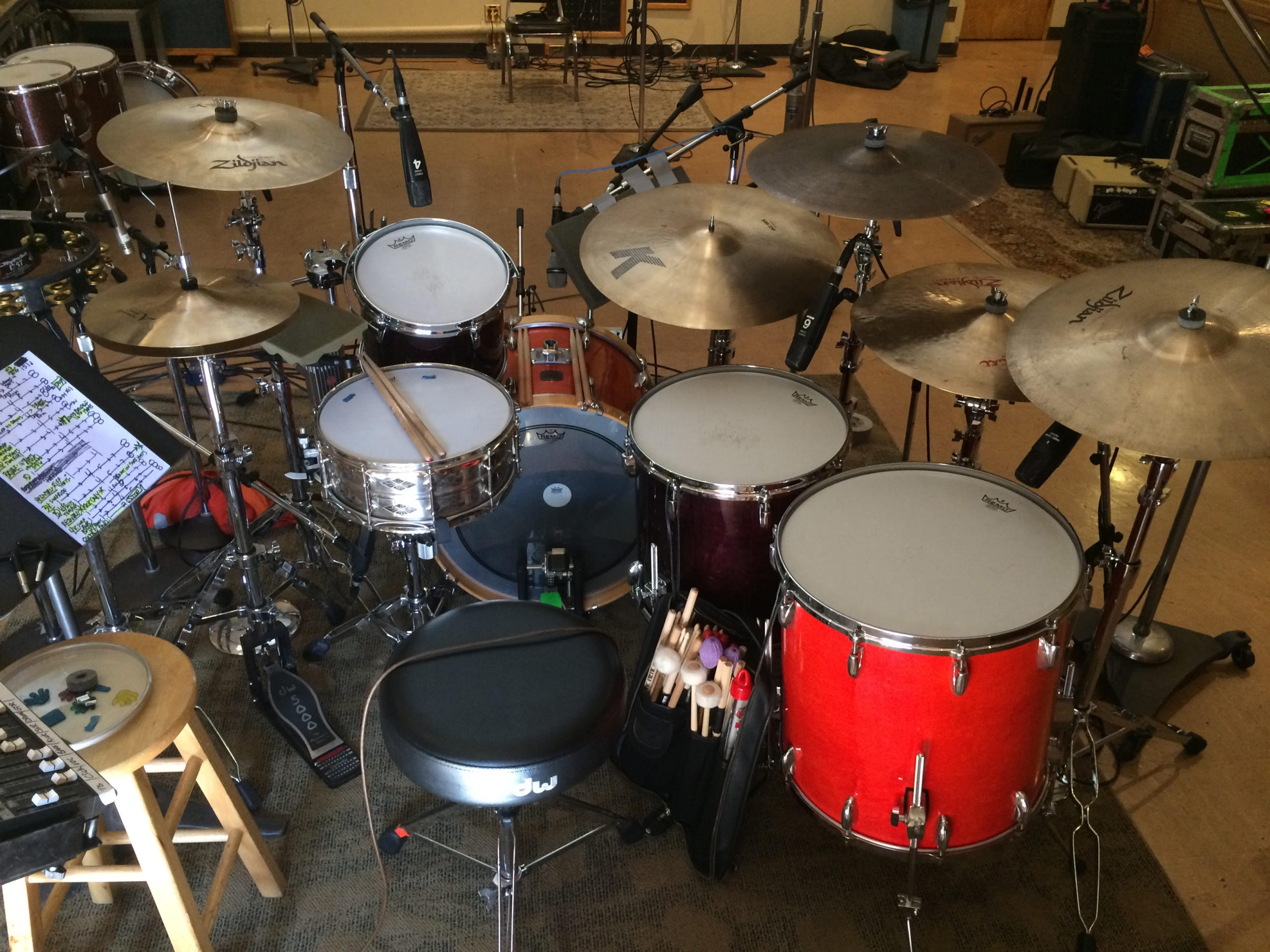
Mike’s Dark Paradise session drum kit at Sunset Sound in Hollywood, January 2018.
How has your playing evolved since joining Tiger Army?
You know it’s funny, for 20 plus years I came from just playing in rock bands, I played in Warrant for ten years on-and-off, I was the seventh, ninth, and eleventh drummer and it was mid-tempo, big drums, big cymbals and big sticks. In Tiger Army, there’s a lot of train beats and shuffles and swing stuff and punk rock beats that swing. We have a song that has a rumba in it, then it goes to punk rock, then it goes back to a rumba. It’s weird. I’m not that meat-and-potatoes basher anymore.
My drumming has shifted to almost a combo player where I’ve lighted up my sticks, thinned out my heads, and use smaller cymbals. It’s crazy. I’ve really evolved. And these Gretsch drums are so articulate and so musical. I’ve really immersed myself in the magic of Gretsch and why they’re amazing drums.
How do you approach your role as drummer in a trio band, like, Tiger Army?
You may have heard the old saying “I’m the drummer and the beat is where I say it’s at.” And I shake my head because it’s not it at all; it’s where the singer wants it. Nick has a great vision of how he wants to push and pull the band depending on the crowd or the room or the mood of the night. So, if you’re a drummer who wants to command the beat, you’ll definitely not be in Tiger Army. You won’t even last one show.
What can an audience expect to hear when they go to see Tiger Army?
There’s something for everyone. I truly believe that. There’s some hard, punk rock psychobilly to mid-tempo rock to a song called “Night Flower,” which is an instrumental. It’s dainty and melodic and you’d think it was a tune from 1956. The band has really evolved and I’m kind of glad because I’m in the hot seat. There are a lot of different styles I have to play, and they always change with how Nick 13 is reading the crowd. I follow his lead and direction.
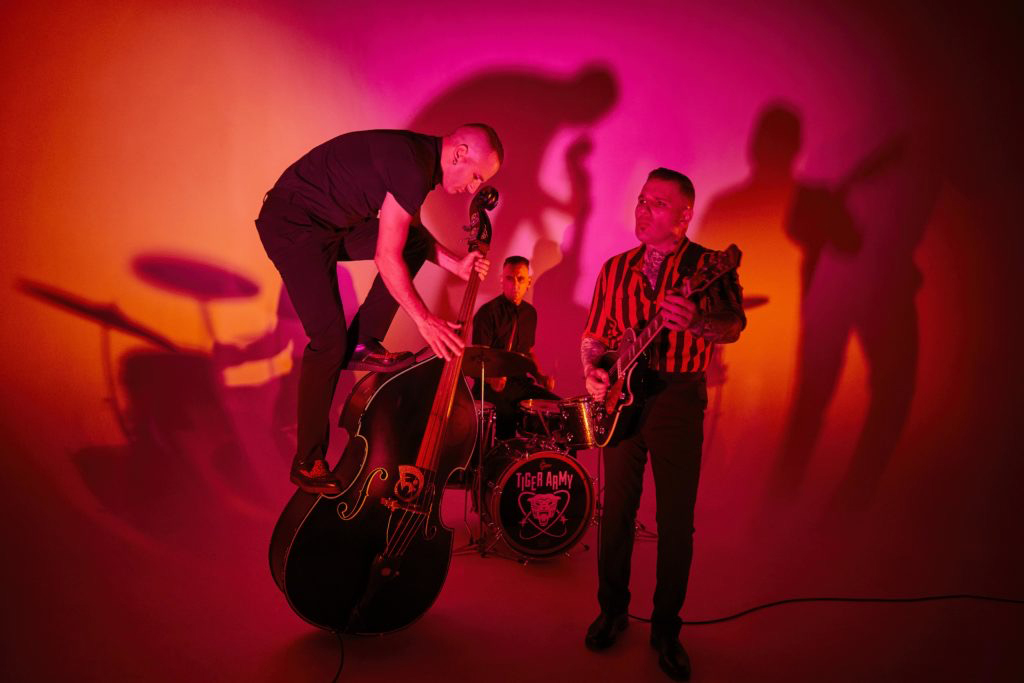
Tiger Army from their “Devil That You Don’t Know” music video. L to R: Djordje Stijepovic, Mike Fasano, Nick 13. Photo Credit: Travis Shinn
Despite all your drum knowledge and experience, you say you’re still a student. How come?
Because I don’t know everything. Not at all. I’m always listening, I’m always refining, adjusting, and trying new things. I think I’m continuing to find myself too. I’ve really shifted gears from being in Tiger Army from 2015 to now. I think that’s what Nick 13 likes about me. He always trusts me and doesn’t question what I am bringing to the table, because he knows I’m trying to make it better for him and the band every time.
And I’m still searching and finding the tools that work best for me, you know? And Gretsch drums are the best tools for me personally, right now, with this band, but they’re also the best drums that I’ve used with other people on their records with many different tunings and head combinations and whatever. They can do anything. They’re just amazing drums. Period.
If you missed Part 1 of this interview, you’ll want to go check it out!
Enjoy “Mi Amor La Luna.” Filmed in Huntington Park, California (and surrounded by real fire flames), this melodic Spanish language single from their Retrofuture album shows both Tiger Army’s evolution as a band and their love of Latin music.



 Previous
Previous